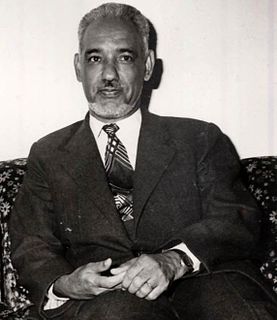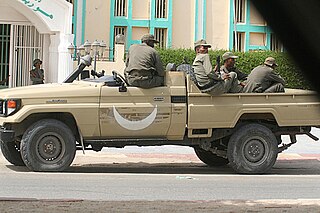The original inhabitants of Mauritania were the Bafour, presumably a Mande ethnic group, connected to the contemporary Arabized minor social group of Imraguen ("fishermen") on the Atlantic coast.

The first fully democratic Presidential election since 1960 occurred on 11 March 2007. The election was the final transfer from military to civilian rule following the military coup in 2005. This was the first time the president was selected by ballot in the country's history. The election was won by Sidi Ould Cheikh Abdallahi, who was ousted by a military coup in 2008 and replaced by general Mohamed Ould Abdel Aziz.

Moktar Ould Daddah was the President of Mauritania from 1960, when his country gained its independence from France, to 1978, when he was deposed in a military coup d'etat.

The Union of the Forces of Progress is a left leaning political party in Mauritania.

The National Assembly is the legislative house of Parliament of Mauritania. The legislature has 157 members, elected for five-year terms in single or two-seats constituencies. From 1961 until 1978, the only legal party in the country was the Mauritanian People's Party. The legislature was disbanded after the 10 July 1978 coup. In 1992, a bicameral legislature was established, consisting the National Assembly and Senate of Mauritania. In the 1990s, a multiparty system was introduced in Mauritania. However, the Democratic and Social Republican Party dominated the parliament until a coup in 2005. The first truly democratic elections were held in 2006.
This article is about the history of Mauritania from 1960 to 1978. Mauritania, officially the Islamic Republic of Mauritania, is an Arab Maghreb country in West Africa. It is bordered by the Atlantic Ocean in the west, by Western Sahara in the north, by Algeria in the northeast, by Mali in the east and southeast, and by Senegal in the southwest. It is named after the ancient Berber Kingdom of Mauretania, which later became a province of the Roman Empire, even though the modern Mauritania covers a territory far to the south of the old Berber kingdom that had no relation with it.

A coup d'état took place in Mauritania on August 6, 2008, when Mauritanian President Sidi Mohamed Ould Cheikh Abdallahi was ousted from power by a group of high-ranking generals he had dismissed from office earlier that day.

A presidential election was held in Mauritania on 18 July 2009. Mohamed Ould Abdel Aziz, who led the 2008 coup d'état, won a narrow first-round majority in the election, according to official results. A second round, if necessary, would have been held on 1 August 2009.

Parliamentary elections were held in Mauritania on 17 May 1959. The result was a victory for the Mauritanian Regroupment Party, which was the only party to contest the elections, thereby winning all 40 seats in the National Assembly. Voter turnout was 90.3%.

Presidential elections were held for the first time in Mauritania in August 1961 to elect the President for the next five years. Moktar Ould Daddah, who had been acting head of state since independence from France in 1960 was the only candidate, and was elected unopposed. Although he was a member of the ruling Mauritanian Regroupment Party, his candidacy was also supported by the Mauritanian National Union. Voter turnout was 93.6%.

Presidential elections were held in Mauritania on 7 August 1966. Following the merger of all the country's political parties into the Mauritanian People's Party (PPM), the country had become a one-party state in December 1961. Its leader, incumbent President Moktar Ould Daddah, was the only candidate, and was re-elected unopposed. Voter turnout was 96.2%.

General elections were held in Mauritania on 8 August 1971 to elect a President and National Assembly, the first time the two elections had been held together. At the time, the country was a one-party state with the Mauritanian People's Party (PPM) as the sole legal party. Its leader, incumbent President Moktar Ould Daddah, was the only candidate in the presidential election, and was re-elected unopposed to a third term in office, whilst the PPM won all 50 seats in the National Assembly election. Voter turnout for the parliamentary election was reported to be 95.6%.

General elections were held in Mauritania on 8 August 1976 to elect a President and National Assembly. At the time, the country was a one-party state with the Mauritanian People's Party (PPM) as the sole legal party. Its leader, incumbent President Moktar Ould Daddah, was the only candidate in the presidential election, and was re-elected unopposed, whilst the PPM won all the seats in the National Assembly election. Voter turnout was 97.9%. They were the last elections held until the restoration of multi-party democracy in 1992.

Parliamentary elections were held in Mauritania on 26 October 1975. The country was a one-party state with the Mauritanian People's Party (PPM) as the sole legal party. It therefore won all 70 seats in the National Assembly. Voter turnout was 87.4%.
Mauritanian National Renaissance Party was an Arab nationalist political party in Mauritania from 1958 to 1961. It was led by Ahmed Baba Miské.
The Mauritanian National Union was a political party in Mauritania. The party was founded in April 1959, as a merger between a dissident group in the Mauritanian Regroupment Party (PRM) and the Union of Natives of Southern Mauritania (UOMS). The foundation of the party took place in the run-up to the May 1959 legislative elections. Members of the party bureau of UNM included Hadrami Ould Khatrri, Moussa Sall, Yacoub Ould Boumediana (chairman) and Ba Abdoul Aziz. The UNM favoured unity with the neighbouring states in the Mali Federation.
Aïssata Touré Kane is a former Mauritanian politician who was the country's first female government minister. After holding leadership positions in the youth wing and women's section of the Mauritanian People's Party, she served in the cabinet of President Moktar Ould Daddah from 1975 to 1978. Her time as a minister ended when Daddah's government was overthrown by a military coup.






